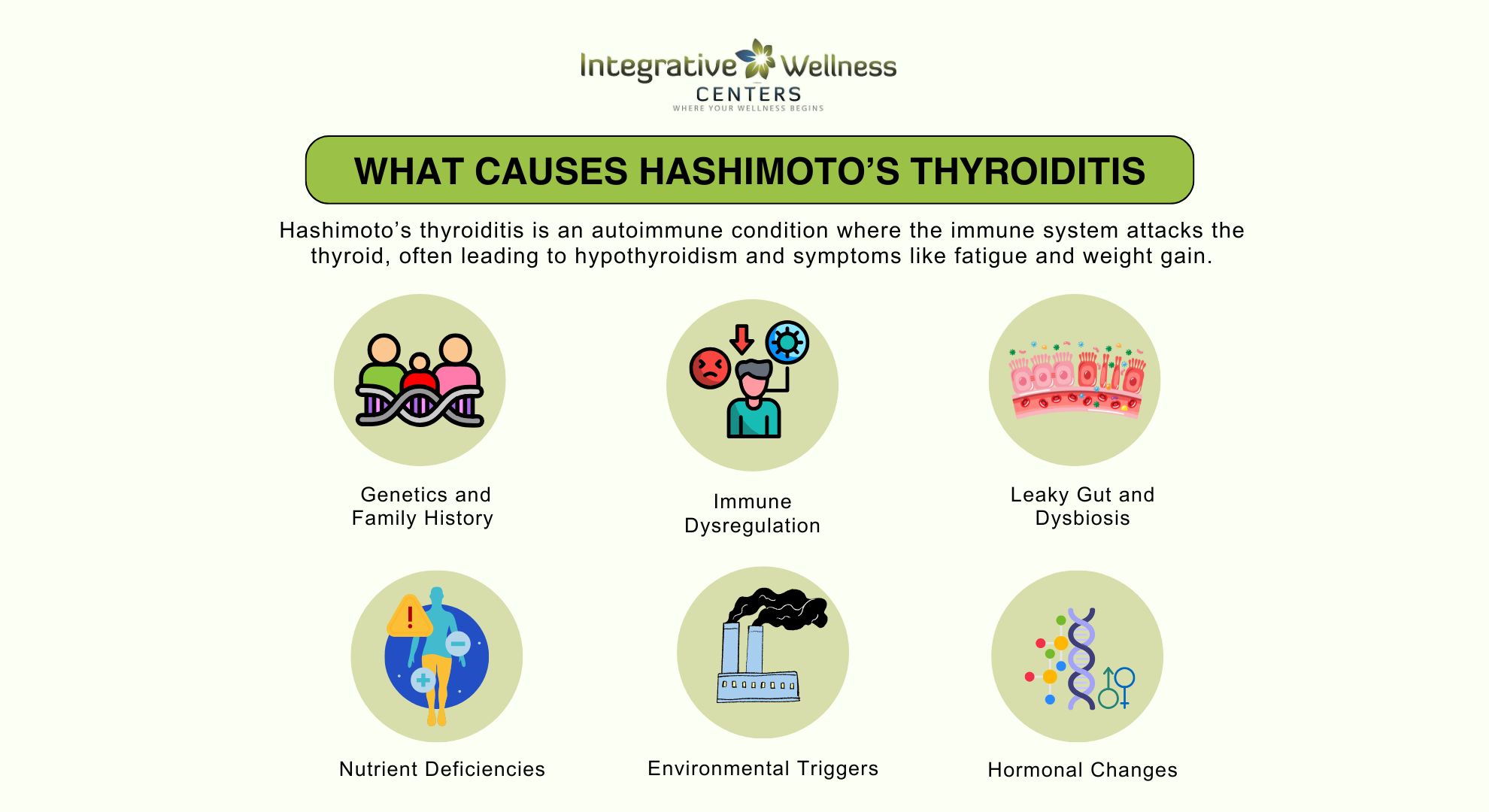Learn what Hashimoto’s thyroiditis is, its symptoms, causes, and treatments.
Hashimoto’s thyroiditis is one of the most common causes of hypothyroidism in the United States and worldwide. It is an autoimmune condition in which the immune system mistakenly attacks the thyroid gland, leading to inflammation and gradual loss of thyroid function.
At Integrative Wellness Centers, we look beyond symptom management and focus on root cause medicine to help patients in Michigan and beyond restore thyroid balance, improve energy, and address underlying immune triggers.
In this article, we’ll cover everything you need to know about Hashimoto’s thyroiditis, including what it is, its symptoms and early warning signs, possible causes, and how it’s diagnosed
Hashimoto’s thyroiditis, also called chronic lymphocytic thyroiditis, is an autoimmune condition where the immune system produces antibodies that target thyroid proteins like thyroid peroxidase (TPO) and thyroglobulin (Tg). Over time, this leads to chronic inflammation of the thyroid gland and reduced production of thyroid hormones.
Many people live with Hashimoto’s for years without symptoms, but as thyroid hormone levels begin to decline, signs of hypothyroidism often develop.
Hashimoto’s symptoms often develop slowly and can be easy to miss at first. Common signs include:
If you are experiencing multiple symptoms, testing for Hashimoto’s thyroiditis can help you get answers.

Hashimoto’s is caused by a combination of genetics, immune dysregulation, and environmental triggers. Some common contributors include:
Because triggers are different for each person, a personalized approach is the most effective way to slow or stabilize thyroid damage.
Diagnosing Hashimoto’s involves a combination of lab tests and clinical evaluation. Common tests include:
Testing is important even if your TSH is “normal” but you have symptoms — antibody elevation can appear years before thyroid hormone levels drop.
The standard medical treatment is levothyroxine, a synthetic form of T4 hormone. This helps normalize TSH and reduce symptoms of hypothyroidism. For some patients, combination therapy with T4 and T3 may be helpful.
In addition to medication, supporting the immune system and thyroid health can help slow progression:
Our approach at Integrative Wellness Centers focuses on uncovering what is driving your autoimmunity so we can create a plan that works for your unique biology.
Consider seeing a thyroid specialist or functional medicine provider if you:
Hashimoto’s thyroiditis can feel overwhelming, but it doesn’t have to define your life. With the right testing, proper treatment, and a focus on uncovering root causes, it is possible to reduce symptoms, slow the progression of thyroid damage, and regain your energy and well-being. At Integrative Wellness Centers, we create personalized care plans that address your thyroid, immune system, gut health, and lifestyle to support lasting results.
Dr. Josh Shields, D.C., C.F.M.P. Certified Functional Medicine Practitioner Supporting natural healing since 2003
✨ Schedule your consultation today and take the first step toward balancing your thyroid health. Take our free online health evaluation!
Q1. Can Hashimoto’s be reversed?
Hashimoto’s cannot be “cured,” but immune activity can be lowered, symptoms reduced, and thyroid function stabilized with the right approach.
Q2. Do I have to take thyroid medication forever?
Not always. Some patients can reduce medication needs with root cause care, but this must be monitored with lab testing.
Q3. How long does it take to feel better?
Symptom improvement may take a few weeks to months depending on severity, lifestyle changes, and treatment consistency.
Q4. Can diet alone fix Hashimoto’s?
Diet can dramatically improve symptoms and lower antibodies but usually works best alongside lifestyle support and medical monitoring.
Q5. Is iodine good or bad for Hashimoto’s?
Too much iodine can worsen autoimmunity. Use only under professional guidance.
Q6. Does stress make Hashimoto’s worse?
Yes, chronic stress can increase inflammation and trigger flares. Stress management is key.
Q7. Can Hashimoto’s affect pregnancy?
Yes, untreated thyroid issues can affect fertility and pregnancy outcomes. Managing thyroid health before and during pregnancy is critical.

Take the online digestive evaluation to instantly discover what systems of your body are the cause of your health issues.
Online Digestive EvaluationTake the TestOnline Female Hormone EvaluationOnline Male Hormone Evaluation